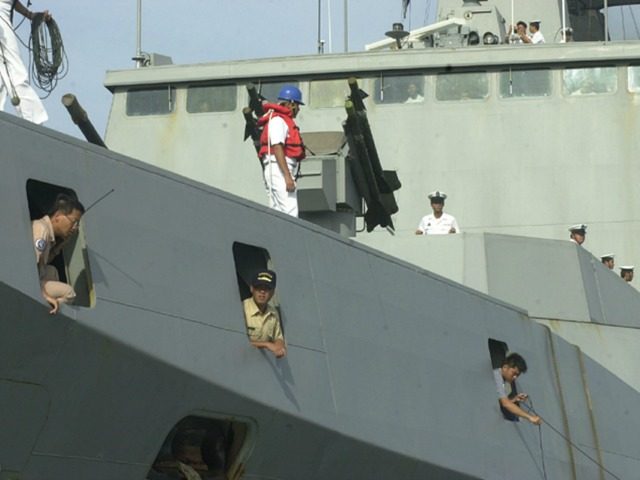The government of Taiwan is planning to request the purchase of new fighter aircraft from the United States, The Guardian reported today, just as it completes the transfer of two decommissioned U.S. Navy frigates. The move comes amid concerns that the Communist Party in Beijing is seeking to crack down on the pro-independence government of President Tsai Ing-wen.
The Guardian cites Taiwanese Defense Minister Feng Shih-kuan as alerting the nation’s legislature that his government is seeking to purchase more modern aircraft to replace its currently fleet of F-16s. Feng’s request for more modern aircraft was a response to a review of Taiwan’s defense capabilities recently released by his ministry and published every four years. The review warned that the Chinese government had significantly expanded its ability to attack Taiwan is necessary. China has invested heavily in military construction in the South China Sea, particularly in regions that are not sovereign Chinese territory but China insists has belonged to them since ancient times.”
The fighter jet purchases are part of a greater proposed defense spending increase in the year’s budget. The South China Morning Post reports that Taiwan is looking to increase its defense spending from two to three percent of its GDP in 2018, a high not seen since 1999. This would mean spending up to $11.4 billion on defense. Tsai’s predecessor, the Kuomintang Party’s Ma Jing-yeou, took a conciliatory approach to relations with Beijing.
The Guardian notes that China is proposing a seven percent increase in its defense spending to $151 billion.
The budget announcement also featured the revelation that Taiwan was now capable of launching missiles that can hit the Chinese mainland, a distance of nearly one thousand miles.
Taiwan recently expanded its naval capability by receiving two decommissioned American Oliver Hazard Perry-class frigates, who began their sail out of American port on March 9. The frigates are expected to begin active duty for the Taiwanese defense forces in May.
The Chinese government appears concerned with Taiwan’s moves to protect itself from a mainland invasion. State propaganda outlet Global Times published a column Friday warning Taipei to abandon hopes of being recognized as a sovereign nation and instead accept the status China insists it has as a rogue province. “No soldiers believe Taiwan forces are capable to defend the island if the People’s Liberation Army (PLA) launches a comprehensive offensive against Taiwan,” the column reads. “As long as the Tsai government accepts of the 1992 Consensus, the island’s security will be ensured. The eight-year-tenure of Ma Ying-Jeou is the most secure period Taiwan has enjoyed since entering the 21st century.”
“Therefore, the most important thing for Taiwan is not to provoke the one-China policy. This is the correct political way to protect the island’s security,” the column concludes.
Taiwan did just that late last year following the election of President Donald Trump in the United States. President Tsai called Trump to congratulate him on his election victory and Trump, in an unprecedented move, accepted the call, implying he understood Tsai to be a fellow head of state. The Chinese communist government condemned Tsai and insisted in assurances from Washington that the Trump administration would not abandon the “One China” policy, which demands foreign nations also deny Taiwan’s sovereignty. Trump reportedly agreed to the One China policy in a February phone call with President Xi Jinping.
Tsai, meanwhile, has insisted on respect for her nation’s self-governance. In a speech in January, Tsai condemned Beijing for “going back to the old path of dividing, coercing, and even threatening and intimidating Taiwan.” “For the sake of safeguarding regional peace and prosperity, I want to once again reiterate that our commitments will not change, and our goodwill will not change. But we will not bow to pressure, and we will of course not revert to the old path of confrontation,” she promised.

COMMENTS
Please let us know if you're having issues with commenting.